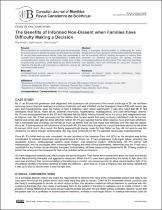| dc.contributor.author | Nortje, Mila | |
| dc.contributor.author | Haque, Sajid | |
| dc.contributor.author | Nortje, Nico | |
| dc.date.accessioned | 2023-03-22T13:23:49Z | |
| dc.date.available | 2023-03-22T13:23:49Z | |
| dc.date.issued | 2022 | |
| dc.identifier.citation | Nortje, M. et al. (2022). The benefits of informed non-dissent when families have difficulty making a decision. Canadian Journal of Bioethics, 5(4)94–95. https://doi.org/10.7202/1094702ar | en_US |
| dc.identifier.issn | 2561-4665 | |
| dc.identifier.uri | https://doi.org/10.7202/1094702ar | |
| dc.identifier.uri | http://hdl.handle.net/10566/8646 | |
| dc.description.abstract | Being a surrogate decision-maker is challenging for many
people and having to decide to withdraw life sustaining therapies
can be extremely difficult. Helping surrogates to refocus their
decisions on informed non-dissent can greatly minimize
unnecessary suffering for all involved. This case study describes
how dignitary harm was minimized by using the concept of
informed non-dissent. | en_US |
| dc.language.iso | en | en_US |
| dc.publisher | Université de Montréal | en_US |
| dc.subject | Surrogacy | en_US |
| dc.subject | Cancer | en_US |
| dc.subject | Type 2 diabetes | en_US |
| dc.subject | Intensive Care Unit (ICU) | en_US |
| dc.subject | Hyperkalemia | en_US |
| dc.title | The benefits of informed non-dissent when families have difficulty making a decision | en_US |
| dc.type | Article | en_US |

